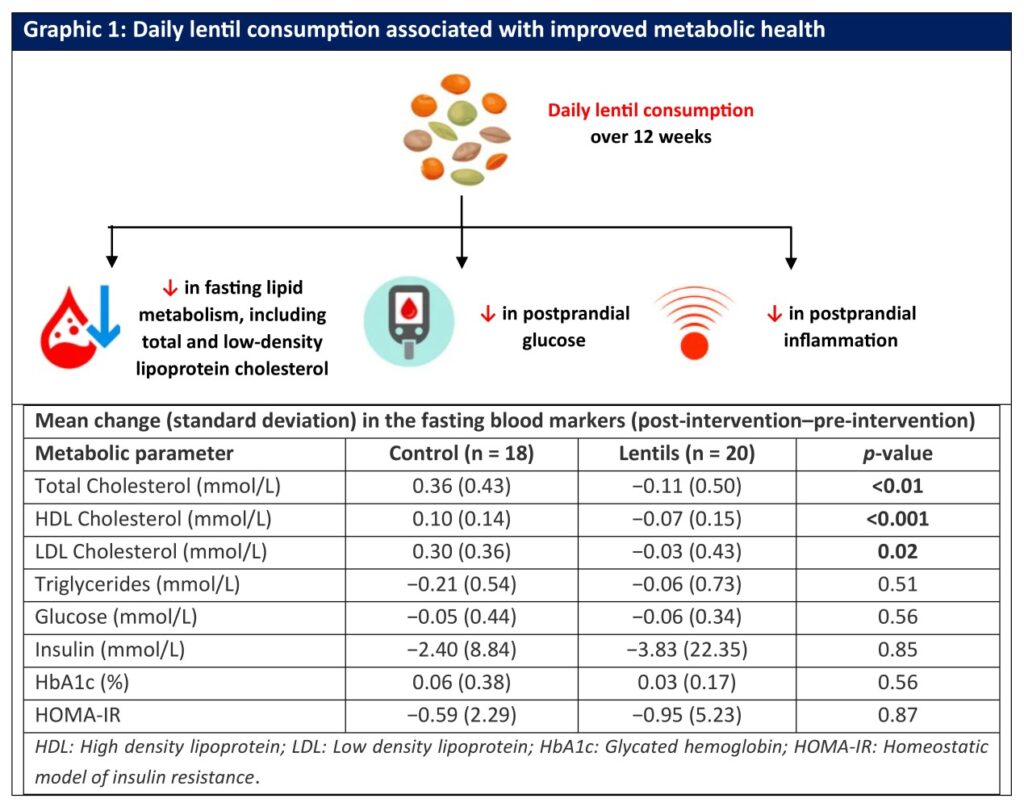
Healthy dietary changes represent an effective means of preventing and reducing the burden of metabolic diseases as diet is a well-known contributor to central adiposity and metabolic dysregulation.
Lentils, a type of pulse, have a unique nutritional profile. They are rich in fiber and protein; besides, they also contain polyphenols (a dietary bioactive compound). Consuming about 300 grams of cooked pulses weekly is recommended by the US Department of Agriculture (USDA).
A study by Chamberlin ML et al., recently published in the journal “Nutrients”, reported that long-term consumption of lentils improves metabolic health by lowering cholesterol and postprandial glycemic and inflammatory responses, without causing gastrointestinal (GI) distress, in individuals at an increased risk for metabolic disease.
This randomized controlled trial aimed to investigate the impact of lentil consumption for 12 weeks on comprehensive metabolic health parameters, including fasting and postprandial measures of lipid metabolism, glycemic control, and inflammation. It included overweight and obese adult participants (n = 38; aged 18–70 years) with a high waist circumference (male ≥40 inches; female ≥35 inches) and having a non-fasting serum triglyceride (TG) concentration >150 mg/dL. The study participants received 980 g (lentils group) or 0 g (control group) of cooked whole green lentils 7 days/week as a mid-day meal for 12 weeks. The participants completed weekly surveys to assess the impact of lentil consumption on GI symptoms and satiety during the 12-week intervention. The participants underwent a high-fat meal challenge involving consumption of a 50-gram oral fat load during the 12-week dietary intervention period. Blood samples were collected after fasting and thereafter, every hour for 5 hours postprandially for the assessment of blood marker levels (lipids, glucose, insulin, insulin resistance, and inflammatory cytokines). General linear models were used to analyze the physical and biological changes across both the groups from pre- to post-intervention. Linear mixed-effects models were used to evaluate the impact of timing and meals on satiety measures and the severity of GI symptoms.
The results are summarized below:
- The anthropometric parameters remained unchanged in both the groups from pre- to post-intervention.
- A higher proportion of patients in the control group had metabolic syndrome compared to the lentils group at baseline (61.1% vs. 20%, p <0.01).
- Daily lentil consumption over 12 weeks led to a reduction in the following (Graphic 1) blood markers:
- Fasting measures of lipid metabolism, particularly total (p <0.01) and low- density lipoprotein (LDL; p = 0.02) cholesterol levels
- Postprandial glucose (p = 0.01)
- Postprandial inflammation markers in response to a high-fat meal: Interleukin (IL)-17 (p = 0.04) and IL-1β (p = 0.03)
- The impact of lentil consumption on metabolic improvements occurred independent of changes in anthropometric measures such as body mass index, body fat mass, etc.
- There was a significant increase in daily average legume consumption for lentil recipients, ranging from 0.1 to 0.6 cups, leading to higher Healthy Eating Index (HEI) scores in four domains.
- The mean response rates to GI survey were 89% for the lentil group and 89.4% for the control group. The GI symptom severity responses for both groups were rated as none or mild.
- The mean response rates to satiety survey were 90.8% for the lentil group and 89.6% for the control group.

Clinical implications
- The study results showed that daily lentils consumption is a safe and effective dietary strategy to improve metabolic health. This strategy is highly applicable towards development of dietary recommendations for lentil consumption.
- This study also indicates that lentil consumption over the USDA recommended dose is not associated with increased GI distress.
- The study highlights the development of pulse-based dietary strategies to reduce the disease risk and to slow or reverse metabolic disease progression in at-risk populations.
(Source: Chamberlin ML, Wilson SMG, Gaston ME, Kuo W-Y, Miles MP. Twelve weeks of daily lentil consumption improves fasting cholesterol and postprandial glucose and inflammatory responses—A randomized clinical trial. Nutrients. 2024;16(3):419. https://doi.org/10.3390/nu16030419)
